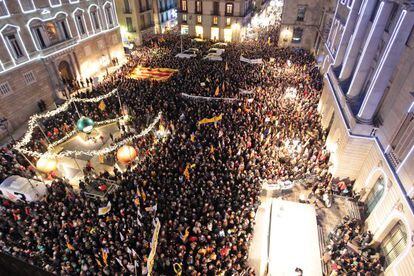Thousands march in favor of Catalan-language school classes
Supporters call proposed education reform "attack" on linguistic freedom

Thousands of people in 60 Catalan municipalities marched on Monday against the central government's plans for education reform, calling it "the greatest attack" on the region's linguistic freedom since Spain's return to democracy.
The largest march was in Barcelona, where police estimated that some 4,500 people gathered in what is already viewed as the first of many public demonstrations of outrage to come. Around 25 nationalist and pro-independence groups were behind the initiative, which attracted political leaders from the leftist ERC party, the conservative nationalist CiU bloc and the Catalan Socialists (PSC).
Protest organizers decried the "retrograde" and "recentralizing" nature of an "educational counter-reformation." A spokesperson for a pro-Catalan umbrella group called Somescola.cat said that Education Minister José Ignacio Wert suffers from "a morbid, pre-constitutional obsession" with the Catalan language, which was persecuted under Franco.
Some of the marchers were old enough to remember those days. "Now that we have managed to normalize Catalan, we cannot go back," said Salvador Llos, 68, adding that under Franco some people gave private Catalan lessons inside apartments as a way to keep the language alive.
Now that we have managed to normalize Catalan, we cannot go back"
Another marcher, Josep Gaya, 55, defended civil disobedience. "What other solution is there if the central government tramples the laws that we have agreed to in our Parlament [the regional assembly]?"
At the heart of the protest is the future Organic Law for the Improvement of the Quality of Education, or LOMCE for short. Wert says he wants to bring Castilian Spanish to the same level as regional languages like Basque or Catalan, which since the advent of democracy have been given priority in their respective regions. Among other things, he said he wants to ensure that parents wishing to school their children chiefly in Spanish at a nearby public school or a colegio concertado (privately run, publicly funded center) can do so, or else be offered free tuition at a private school.
Currently, elmentary and high school education is offered in Catalan, with Spanish taught as a secondary language for a few hours each week. Wert's reform calls for a "balanced proportion" between both, without providing any specifics.
But Catalan nationalists view this as an attack from the conservative Popular Party (PP) against their policy of linguistic immersion in particular, and against Catalonia in general at a time of growing tension over the proposed pro-sovereignty referendum promised by acting Catalan leader Artur Mas.
Languages should not be viewed as a problem but as an opportunity"
Somescola.cat also warned of a "very high risk of social fracture" if the reform goes through. Catalonia has long attracted immigration from other parts of Spain and the world, and its policy of linguistic immersion is a way of ensuring that Catalan is preserved, along the same lines as the Quebec government does with French in Canada.
"Languages should not be viewed as a problem but as an opportunity. In our globalized world, knowing languages opens doors and makes us competitive," says Somescola.cat, which was created two years ago after the Supreme Court ruled against Catalonia's immersion policy in specific cases of parents who sued for the right to public schooling in Spanish.
Meanwhile, the Catalan branch of the PP is trying to rewrite the reform project to make it more palatable for Catalan nationalists, complaining that it was never consulted on the issue. "We had party meetings from a technical viewpoint on the subject of the draft, but not on the final content," said regional party leader Alicia Sánchez-Camacho, who will "complain" to Minister Wert about being left out of the debate.










































